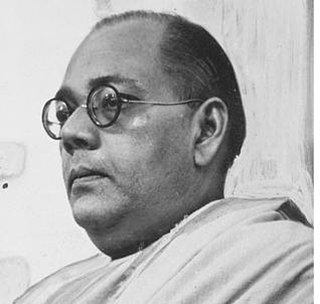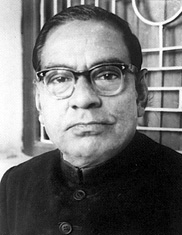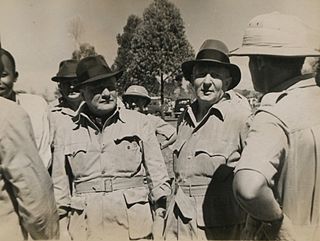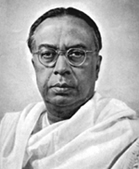
Subhas Chandra Bose was an Indian nationalist whose defiance of British authority in India made him a hero among many Indians, but his wartime alliances with Nazi Germany and Imperial Japan left a legacy vexed by authoritarianism, anti-Semitism, and military failure. The honorific 'Netaji' was first applied to Bose in Germany in early 1942—by the Indian soldiers of the Indische Legion and by the German and Indian officials in the Special Bureau for India in Berlin. It is now used throughout India.

The All India Forward Bloc (abbr.AIFB) is a left-wing nationalist political party in India. It emerged as a faction within the Indian National Congress in 1939, led by Subhas Chandra Bose. The party re-established as an independent political party after the independence of India. During the 1951–1952 and 1957 Indian general election, the party was known as Forward Bloc (Marxist). It has its main stronghold in West Bengal. The party's current Secretary-General is G. Devarajan. Veteran Indian politicians Sarat Chandra Bose (brother of Subhas Chandra Bose) and Chitta Basu had been the stalwarts of the party in independent India.

Netaji Subhas Chandra Bose: The Forgotten Hero is a 2004 Indian epic biographical war film, written and directed by Shyam Benegal. The film starred an ensemble cast of Sachin Khedekar, Kulbhushan Kharbanda, Rajit Kapur, Arif Zakaria, and Divya Dutta, among others. The film depicts the life of the Indian Independence leader Subhas Chandra Bose in Nazi Germany: 1941–1943, and In Japanese-occupied Asia 1943–1945, and the events leading to the formation of Azad Hind Fauj.

The Pakistan Muslim League (Functional) (Urdu: پاکستان مسلم لیگ (ف), acronym: PMLF, PML-F, PML (F)) is a nationalist and pro-Hurs clan political party in Pakistan. It is one of the Pakistan Muslim Leagues. The letter 'F' in its name stands for functional. It is primarily associated with the Sindhi religious leader Pir Pagara. It was formed in 1985 when the Pakistani establishment decided to make Muhammad Khan Junejo the president of united PML. In response, Pir Pagara Syed Shah Mardan Shah-II parted ways with the mother league and formed his own party.

Sanghar District (Sindhi: ضلعو سانگھڙ, Urdu: ضلع سانگھڑ) is one of the largest districts of Sindh province, Pakistan. This district lies between 25058'13 N latitudes and 69024'4E longitudes. It was a village before Mallah Tribe were settled there. This district has the largest Mallah tribe population. It has an area of 9874 square kilometres. It is located in the centre of Sindh and is bounded to the east by India. The district capital, Sanghar, is itself a small city roughly 35 miles (56 km) east-south-east of the city of Nawabshah and the same distance north of Mirpur Khas. Its primary industry is agriculture.

Pir or Peer is a title for a Sufi spiritual guide. They are also referred to as a Hazrat and Sheikh or Shaykh, which is literally the Arabic equivalent. The title is often translated into English as "saint". In Sufism, a Pir's role is to guide and instruct his disciples on the Sufi path. This is often done by general lessons and individual guidance. Other words that refer to a Pir include Murshid and Sarkar.

Hurs are a Sufist community in the province of Sindh, Pakistan who adhere to Sunni Islam. Their current spiritual leader is Pir of Pagaro VIII, who serves as a politician in the Provincial Assembly of Sindh.

The Allahabad Address was a speech by scholar, Sir Muhammad Iqbal, one of the best-known in Pakistani history. It was delivered by Iqbal during the 21st annual session of the All-India Muslim League, on the afternoon of Monday, 29 December 1930, at Allahabad in United Provinces. In this address Iqbal outlined a vision of independent states for the great Muslim-majority provinces in northwestern India, thus becoming the first politician to articulate what would become known as the Two-nation theory—that Muslims are a distinct nation and thus deserve political independence from other regions and communities of India.

Sarat Chandra Bose was an Indian barrister and independence activist.
Khwaja Abdul Hamied FCS, FRIC was an Indian industrial and pharmaceutical chemist who founded Cipla, India's oldest pharmaceutical company in 1935. His son, Yusuf Hamied headed the company after him for the next 52 years.

Abul Mansur Ahmad was a Bangladeshi politician, writer, and journalist.

Shah Nawaz Khan was an Indian politician who served as an officer in the Indian National Army (INA) during World War II. He was profoundly influenced by Subhas Chandra Bose's speeches asking POWs to join the Indian National Army and to fight for a free India, Khan led the army into North-Eastern India, seizing Kohima and Imphal which were held briefly by the INA under the authority of the Japanese. In December 1944, Shah Nawaz Khan was appointed Commander of the 1st Division at Mandalay. After the war, he was tried, convicted for treason, and sentenced to death in a public court-martial carried out by the British Indian Army. The sentence was commuted by the Commander-in-chief of the Indian Army following unrest and protests in India. After the trial, Khan declared that he would henceforth follow the path of non-violence espoused by Mahatama Gandhi and joined the Congress party. Having successfully contested the first Lok Sabha in 1952 from Meerut, Khan had an illustrious parliamentary career. He was elected four times to the Lok Sabha from Meerut constituency in 1951, 1957, 1962 and 1971. He lost in the 1967 and 1977 Lok Sabha election from Meerut.
Satpanth is a Sanskrit term, given to a diverse group of individuals who follow Pir Sadardin. Pir Sadardin Imamshah Bawa, was a Shia Ismaili Da'i who founded the Satpanth Tariqa around 600 years ago, and taught tolerance, perennialism and syncretism of all religions, putting a particular emphasis on the syncretism of Islam and Hinduism.

Sir Hugh Dow was a British colonial administrator and diplomat who served as the governor of Sindh from 1941 to 1946. He also served as the British consul-general to Jerusalem from 1948 to 1951, after the independence of India from British colonial rule. The Dow Medical College is named after him.
Sayyid Shah Mardan Shah-II widely known as Pir of Pagaro VII was the spiritual leader of Hurs and president of political party Pakistan Muslim League (F). He was commonly known in Pakistan as Pir Sahib Pagara and Pir Shaab. He was an influential figure in Pakistani politics and the leader of Hur Force in Pakistan who participated in the Indo-Pakistani War of 1965. He was also a first-class cricketer. He died on 10 January 2012 in London, due to liver infection.

Sibghatullah Shah Rashdi III, also known as Raja Saein, the eighth Pir of Pagaro, is a Pakistani politician who has served as a member of Provincial Assembly of Sindh.

Opposition to the Partition of India was widespread in British India in the 20th century and it continues to remain a talking point in South Asian politics. Those who opposed it often adhered to the doctrine of composite nationalism in the Indian subcontinent. The Hindu, Christian, Anglo-Indian, Parsi and Sikh communities were largely opposed to the Partition of India, as were many Muslims.

Composite nationalism is a concept that argues that the Indian nation is made up of people of diverse cultures, castes, communities, and faiths. The idea teaches that "nationalism cannot be defined by religion in India." While Indian citizens maintain their distinctive religious traditions, they are members of one united Indian nation. Composite nationalism maintains that prior to the arrival of the British into the subcontinent, no enmity between people of different religious faiths existed; and as such these artificial divisions can be overcome by Indian society.
Rezaul Karim was a Bengali Muslim lawyer and member of the Indian National Congress. During the Indian independence movement, he was a champion of composite nationalism and a united India.

Kiran Shankar Roy, also credited as Kiron Sankar Roy was an Indian Bengali politician, academic, and freedom fighter. He was one of the leading figures of the Swaraj Party in the anti-British independence movement of the Indian subcontinent and one-time colleague of Subhas Chandra Bose and associate of Sarat Chandra Bose. He was one of Bengal's big five prominent Congress leaders during the two decades 1920s and 1940s. Roy, Leader of the Congress Parliamentary Party in the Bengal Assembly, participated in the United Independent Bengal movement of 1947














